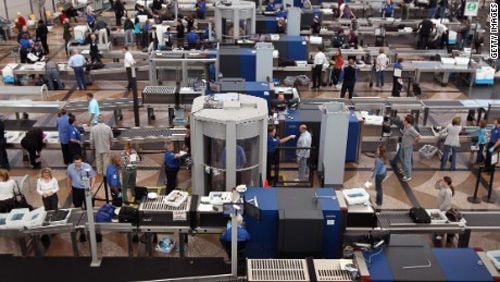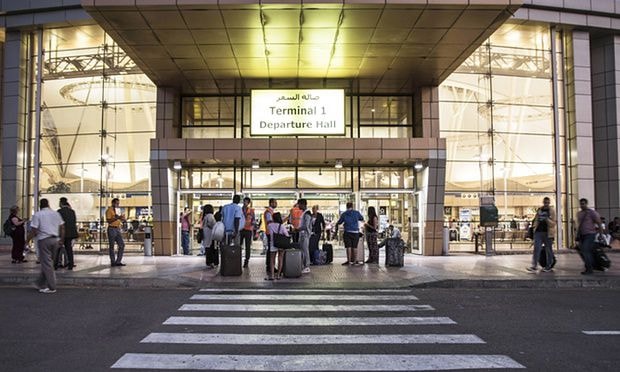World aviation faces existential challenge
(Baonghean) - Bombing of the plane is the leading hypothesis to explain the Russian plane crash that killed 224 people. If this is true, the world's aviation security is facing a challenge called terrorism.
Fear gripped
A week after the Russian plane crash in the Sinai Peninsula (Egypt), investigations are being conducted intensively but there is still no final conclusion. A series of countries have implemented aviation security plans to ensure the safety of their citizens. First were the decisions to "avoid Egyptian airspace" by the UK, France, Belgium, the Netherlands, Germany...
The US Department of Homeland Security then announced new security measures, including stricter baggage checks before boarding, for flights from many airports in the Middle East to the US. President Vladimir Putin also had to order the suspension of flights to and from Sharm el-Sheikh, although Russia had previously criticized the moves of the UK and Western countries as “too hasty”. It is easy to feel the tension in the international community when mentioning the “threat” from Sharm el-Sheikh.
 |
| The US tightens security at Denver International Airport (USA). Photo: Internet |
Western officials have so far confirmed that the plane crash was 90% due to a bomb planted by terrorists. According to AFP (France), the analysis of the black box of the Russian plane that crashed in Egypt on October 31 showed that the flight data recorder and flight voice recorder were "completely normal" until both stopped working 24 minutes after the plane took off from the Egyptian resort of Sharm el-Sheikh. It is likely that there was "pressure from a sudden explosion", "strongly reinforcing" the hypothesis that a bomb exploded on the plane before the crash.
Escalation of terrorism
The possibility of terrorist attacks requires countries to reconsider the issue of aviation security and safety. If the recent tragedy was carried out by terrorists, this could be a significant escalation in IS's attack capabilities and strategic goals, and mark a turning point in the global war on terror.
Since 2014, IS has called on its followers worldwide to kill non-Muslims “by any means possible”. Following that call, IS-fanatic “lone wolves” have carried out a number of isolated attacks in Western societies, killing soldiers or police to show off their prestige. Experts say that IS previously lacked the capacity and potential to carry out large-scale attacks like the 9/11 terrorist attacks or the Bali bombings carried out by al-Qaeda.
But over time, it appears that IS militants have gained access to advanced bomb-making techniques and changed their strategic focus. “I’m not saying this is the attack method that IS will use from now on,” said Dr. Clarke Jones of the Australian National University. “But the Russian incident shows that it’s time to rethink our aviation security system.”
There are concerns that the real cause behind Russia’s biggest air disaster is similar to Lockerbie: revenge. It is possible that the extremist Islamic State terrorist group sought to destroy the Kogalymavia plane to avenge President Vladimir Putin’s air campaign against IS in Syria. The group also wanted to demonstrate its capabilities, that it was strong enough to retaliate against its enemies, even if that was Russia.
Need a change
Whether it is true or not, the threat of IS terrorism targeting flights is real and is a challenge for the world aviation industry. Many experts are even concerned that the militants may target major US targets in the future, especially civil aircraft.
Dealing with the growing terrorist threat from IS will put enormous pressure on the US intelligence community and countries around the world, especially as the militants' bomb-making techniques become more sophisticated. In the short term, airlines can divert their flights away from certain dangerous areas, limiting landings at airports considered to have low security levels.
In addition, airport security control is considered a very important task. After the incident in Sinai, Western media quoted many passengers saying that the airport security control system in Sharm el-Sheikh had too many loopholes. Security control procedures were carried out in a perfunctory manner when security staff received a little "bribe" from passengers.
 |
| Passengers at the large waiting room at Sharm el-Sheikh airport (Egypt). AP photo. |
Recently, Egyptian authorities have checked the airport security camera system to detect subjects who bypass security staff and metal detectors. This action, although late, is considered necessary not only in Egypt but also many other airports in the Middle East - a hot spot of violence, and all countries in the world for the safety of the aviation industry.
Despite the fierce anti-terrorism campaign in recent times, the fear and presence of terrorism is still increasing. Terrorist groups such as IS are increasingly demonstrating their barbaric and hateful nature. Therefore, in the coming time, there may need to be a breakthrough change in the anti-terrorism campaign.
Thanh Huyen
| RELATED NEWS |
|---|
